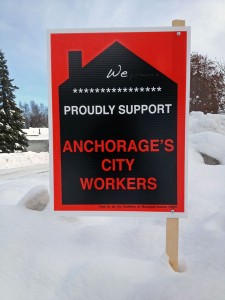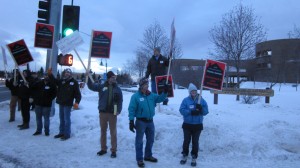Hundreds of union workers turned out to testify before the Anchorage Assembly Wednesday night, against an ordinance that could limit unions.
 Cars driving by honked their horns in support of protesters at the corner of Denali & 36th outside Loussac Library.
Cars driving by honked their horns in support of protesters at the corner of Denali & 36th outside Loussac Library.
That’s where I found Kimberly holding a red and black sign in support of unions and her dad, a union member who works for the Anchorage School District.
“I know he works very hard for what he does and so I wanted to support him for that because he supported me for so long .”
Kimberly’s Dad, Tom says his job isn’t at stake, because he’s not a municipal employee. But Tom says if the Mayor’s proposed ordinance is passed, he’s afraid his job could be next.
“I think the big fear is the reduction in the standard of living for your middle-class people. And we’re just tired of seeing the erosion of the middle-class. We want to make the middle-class strong. That’s why this country became real strong is because of the middle-class, not because we have rich and poor with nobody in between.”
 Tom and Kimberly did not want us to use their last names. Near the library entry, it was a sea of more red and black signs and a saxophone serenaded protesters.
Tom and Kimberly did not want us to use their last names. Near the library entry, it was a sea of more red and black signs and a saxophone serenaded protesters.
Officials estimate there could have been around a thousand people at the hearing which took place in the Anchorage Assembly chambers at the Loussac library. The Wilda Marston Theatre was opened with live broadcast from Assembly Chambers, and others crowded into the entry to sit and stand around a T.V. Inside the Assembly Chambers, It was standing room only and a line to testify stretched from the podium to the back of the room.
Mayor Dan Sullivan proposed the ordinance, which would would impact approximately 22-hundred municipal employees, about three weeks ago. It eliminates raises based on longevity and performance, links pay to a five-year average of the consumer price index and limits benefit choices. It also eliminates the option of a strike. But it’s centerpiece is the introduction of managed competition, a process in which a public agency competes with private firms to provide public services. Fire and police departments as well as emergency services would be exempt from managed competition. Public testimony was emotional, as one municipal employee after another got up in front of the Assembly to tell them the ordinance was a bad idea. Municipal worker Roy Smith, who said he’s live in Anchorage for nearly 30 years and worked for he city nearly a decade, said the ordinance was evil.
“Almost as evil as, what do I want to compare it with? How bout the movies, how bout Star Wars — Darth Vader and the Dark Side of The Force. This is wrong. I know you mean well. And I’ll tell you what, when I hear the radio spot that’s being aired I hear the warm fuzzy stuff in my head, but down here in my gut, this is what tell me the truth — I feel sick.”
Smith was referring to a radio ad that began airing last week featuring Mayor Sullivan talking about his proposed ordinance. Assembly member Dick Traini asked Smith this about the radio ad:
“How do you feel about your tax dollars being utilized to bring that message out to the public? 28-thousand tax dollars in tax payer’s dollars. (Audience)Boooo, booo. (Smith) Thank you very much. I don’t feel good about it all, not at all, not one bit.”
Julius Matthew, a resident of Eagle River, says he’s been a member of the IBEW for 30 years. He says he’s offended by the Mayor’s so-called ‘Responsible Labor Act’.
“There’s nothing responsible about it whatsoever. This is not about money or trying to control the spending of money. This is about control. So Sullivan wants control over thousands of hard-working men and women that have banded together in the form of unions to protect their families against guys like Dan Sullivan.”
Elstun Lauesen, the husband of former Assembley member Harriet Drummond, who is now a statehouse representative for Anchorage, said the Mayor was playing a financial game that was doing more harm than any contracts.
“This Mayor, with the complicity of Miss Frasca, for successive years, brought in budgets under the cap. And when you bring in budgets under the cap, the cap drops. They have created a structural deficit of 28 million dollars.”
Assembly member Honeman asked Laueson for a solution.
“I suggest that you sit down and negotiate in good faith with the working men and women of the municipality and negotiate a contract.”
Cindy Calzada read her brief testimony from a small piece of paper.
“AO37 is a terrible ordinance which begins the destruction the livelihood of working people in this city. More than that, it dishonors and disrespects the memory of all those who fought and died for union rights we have today. With this bill you begin the systematic dismantling of what the working class built over centuries of fighting. You will begin a downward spiral that will put us back to the sixties.”
Ordinance 37 is scheduled for a vote of the Assembly on March 12th.
Listen to the full sotry
Daysha Eaton is a contributor with the Alaska Public Radio Network.
Daysha Eaton holds a B.A. from Evergreen State College, and a M.A. from the University of Southern California. Daysha got her start in radio at Seattle public radio stations, KPLU and KUOW. Before coming to KBBI, she was the News Director at KYUK in Bethel. She has also worked as the Southcentral Reporter for KSKA in Anchorage.
Daysha's work has appeared on NPR's "Morning Edition" and "All Things Considered", PRI's "The World" and "National Native News". She's happy to take assignments, and to get news tips, which are best sent via email.
Daysha became a journalist because she believes in the power of storytelling. Stories connect us and they help us make sense of our world. They shed light on injustice and they comfort us in troubled times. She got into public broadcasting because it seems to fulfill the intention of the 4th Estate and to most effectively apply the freedom of the press granted to us through the Constitution. She feels that public radio has a special way of moving people emotionally through sound, taking them to remote places, introducing them to people they would not otherwise meet and compelling them to think about issues they might ordinarily overlook.




